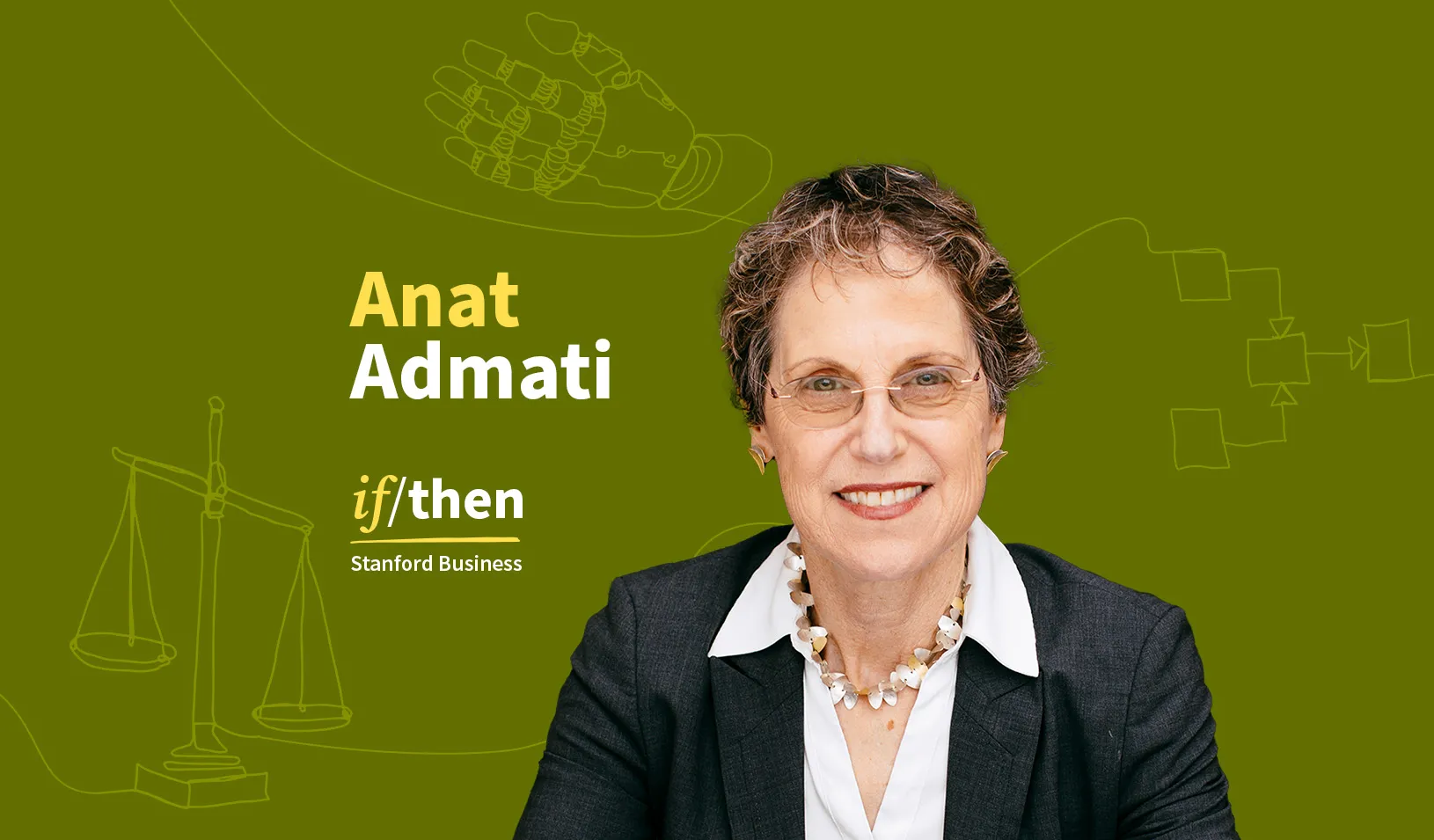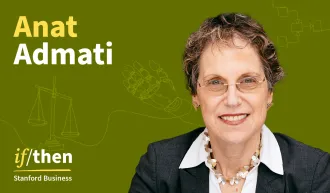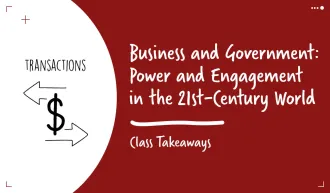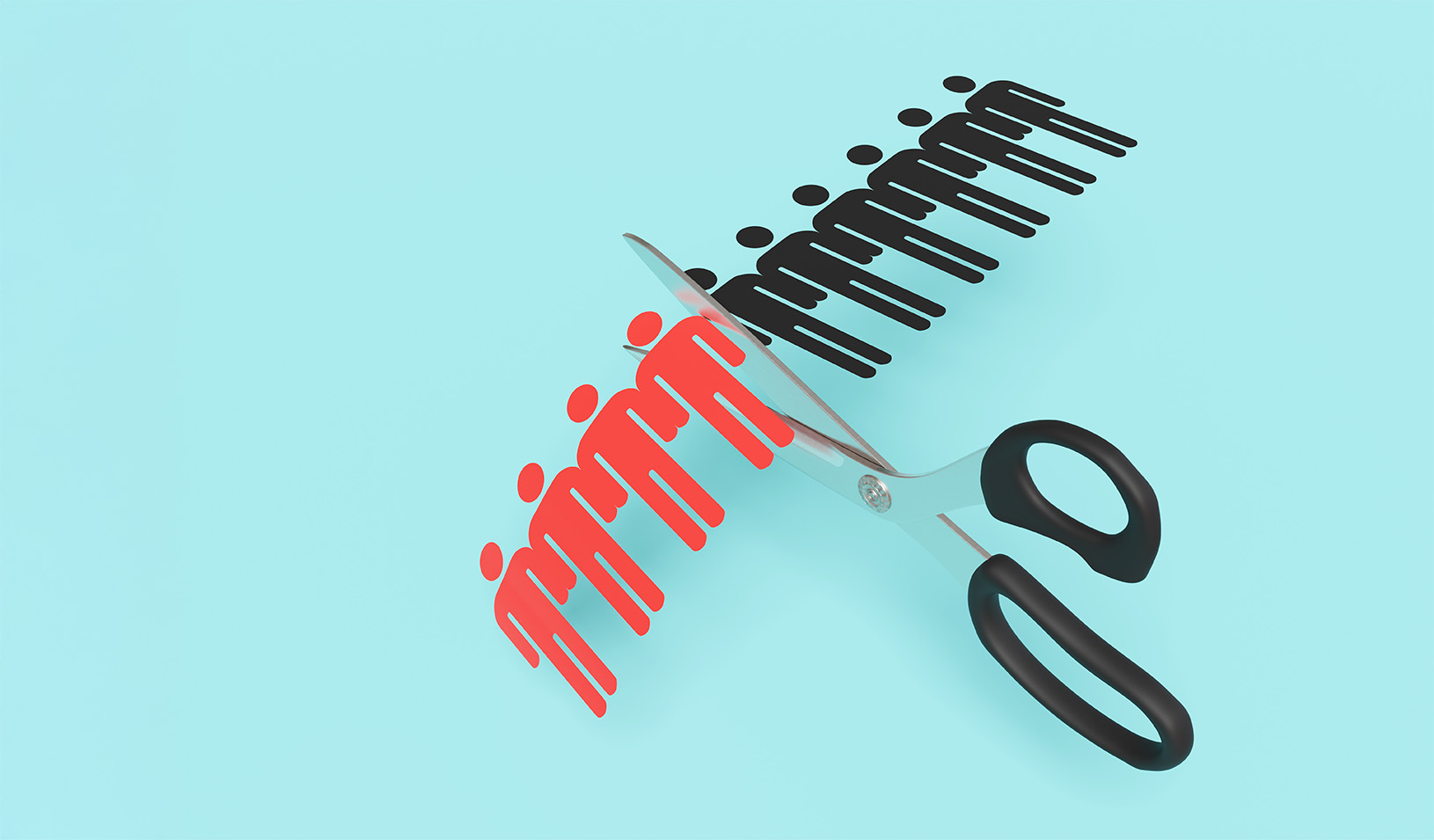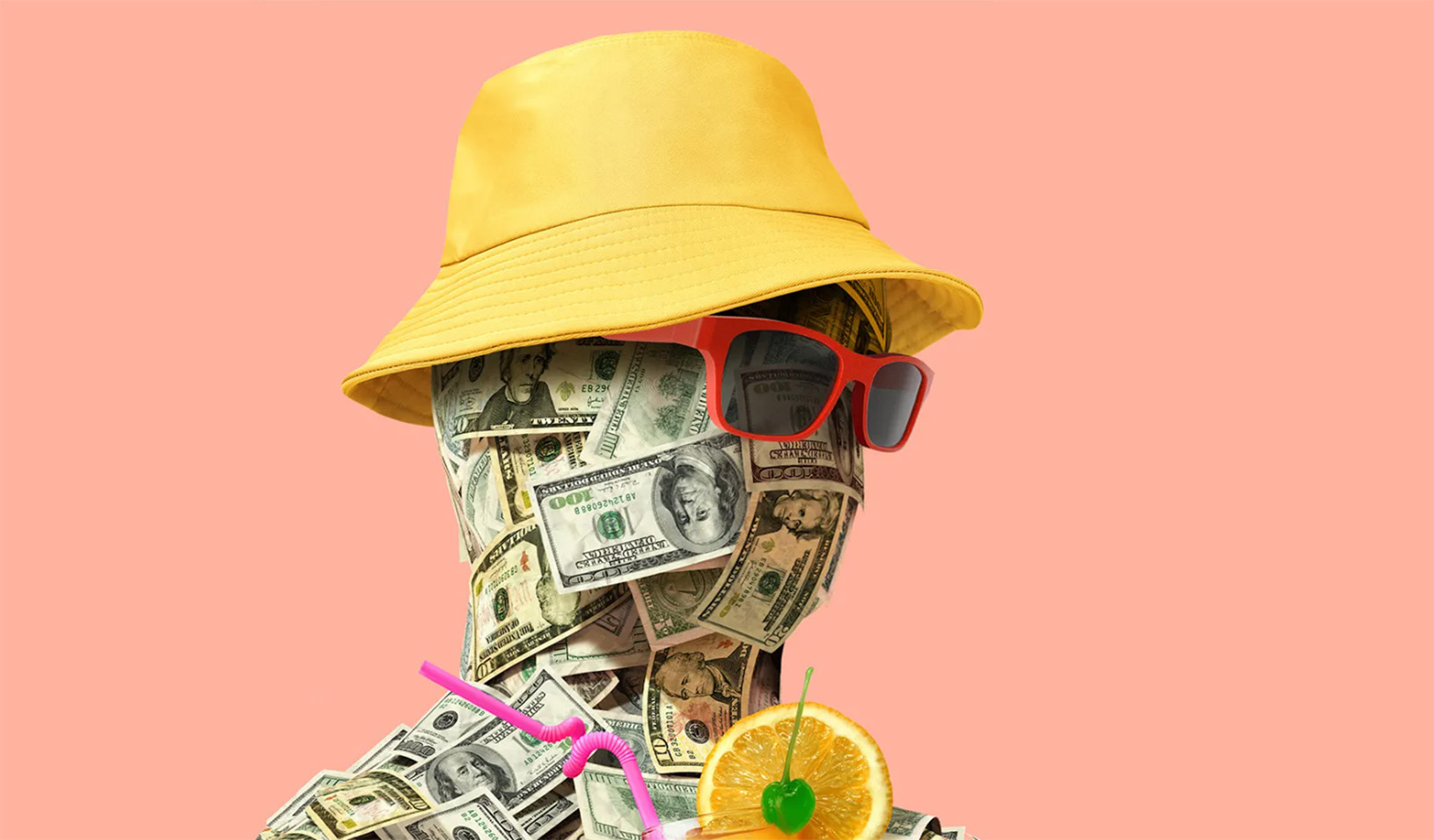There’s an important distinction between trust and trustworthiness, according to Anat Admati, the George G.C. Parker Professor of Finance and Economics at Stanford Graduate School of Business and co-author of The Bankers’ New Clothes.
A functional democratic — and capitalistic — society depends on institutions that are worthy of the public trust, Admati says. Blind faith undermines accountability, in her view, and clever people will break the rules in service of personal gain. Instead, she argues, governments, corporations, and other organizations must be compelled to follow transparent, enforceable standards that serve the public interest.
“I don’t [blame] the ‘evil’ corporations,” Admati says. “I [blame] bad rules — and governments allowing themselves to be talked into these rules or to not enforce rules properly. That’s where I think the focus should be.”
Admati provides examples of how weak rules and a lack of enforcement have led to avoidable social and economic crises. The 2007-2009 financial crisis still remains a troubling lesson. “Somehow the financial system [imploded]… What was going on?” Admati recalls, describing her own process of coming to terms with the calamity.
“As a finance professor, I can tell you that the tools that I knew did not give me the answer…. It became clear early on that the rules were bad — and really bad — and badly designed, and all of that. And that was not so hard to find out. What was hard was actually getting through with saying it. It was really incredibly sobering.”
How do we begin to fix broken systems?
We’re looking for stories about how financial know-how has affected our listeners’ lives. If you have an experience, lesson, or insight you’d like to share, email us at ifthenpod@stanford.edu.
Listen & Subscribe
If/Then is a podcast from Stanford Graduate School of Business that examines research findings that can help us navigate the complex issues we face in business, leadership, and society. Each episode features an interview with a Stanford GSB faculty member.
Full Transcript
Note: This transcript was generated by an automated system and has been lightly edited for clarity. It may contain errors or omissions.
Announcer: This is Dear San Francisco from The Seven Fingers. Let’s go!
Kevin Cool: Dominic Cruz is about to take the stage.
Dominic Cruz: We have a saying we say before every show, it’s “believe in yourself, believe in the show, and believe in each other.”
Kevin Cool: Dear San Francisco is a love letter to the city in the form of a circus show. It features nine performers each night, including Dominic and his partner, Maya Kesselman Cruz.
Dominic Cruz: We’re both acrobats, but Maya is primarily a flyer, which means that she gets thrown.
Maya Kesselman Cruz: In our nine years of our romantic relationship, we’ve been working together that entire time.
Kevin Cool: Maya and Dominic are married, but they say the whole cast feels like family. That sense of closeness helps them rely on each other to do some pretty dangerous moves in front of a live audience.
Maya Kesselman Cruz: It is important. The stakes are humongous. I mean, let’s say the person who’s supposed to catch me doesn’t catch me
Kevin Cool: For so many aspects of the show, success depends on trust.
Dominic Cruz: You have to trust someone’s going to catch you, and you can’t react to the fear of maybe not being caught in the right way.
Kevin Cool: Dominic described a trick in the show that exemplifies this. It involves something called a two-high, where one performer stands on another’s shoulders. This trick involves two two-highs combined.
Dominic Cruz: And then we have Maya, my wife, at the top, which can also be considered the most dangerous place.
Kevin Cool: Dominic is a spotter for this trick. That means his job is to catch the other acrobats, if something goes wrong.
Dominic Cruz: You’ve got to trust us to catch you. I have to be ready every single night for something to happen, because if something happens and I’m supposed to catch someone and I don’t, that’s my fault. Wow. Even just thinking about it makes me, it’s a lot of emotions, you know? ‘Cause you’re like, I’m out there watching her do something super dangerous. So we’re standing in a circle, we’re spotting, and she climbs up until she finally gets to the top and the music crescendos and everyone loses their minds because they’re like, I’m looking at two people standing on top of one person. It’s like, so hard. It’s one of the hardest tricks we do in the show. And then Maya gets thrown off the three high, and me and Eduardo catch her. Every time I’m watching this trick, I’m like, this is so hard. And we do this every night.
Kevin Cool: Dominic and Maya say the trust depends on the culture and the structures that they have in place, which allows them to perform safely night after night. And if someone breaks that trust, the consequences go beyond the potential life-threatening injuries. It means that person never works in the circus again.
Dominic Cruz: You can’t be dependable.
Maya Kesselman Cruz: That’s dangerous immediately. That’s dangerous. You’re flagged as dangerous. The world is, circus world is very small. It’s all over the world, but also a very small world.
Kevin Cool: It’s not just in the circus world where this applies. Anat Admati, a professor of finance and economics at Stanford Graduate School of Business, and co-author of the book The Banker’s New Clothes: What’s Wrong With Banking and What To Do About It, says trust and trustworthiness are key to any functioning democracy.
Anat Admati: The trust ultimately has to be with the government, but the government then on its part has to create accountability for all people.
Kevin Cool: And that’s our focus today. How much our democracy depends on trust and the ways that we create it. This is If/Then, a podcast from Stanford Graduate School of Business, where we examine research findings that can help us navigate the complex issues facing us in business, leadership, and society. I’m Kevin Cool, senior editor at Stanford GSB.
Kevin Cool: I want to start our conversation today by talking about trust, or maybe the lack thereof, that has resulted from bad behavior by corporations. We’ll talk about the banking sector later on, but let’s talk about the social harms that are created when corporations act badly, whether that’s Purdue, pharma, whatever that might be.
Anat Admati: Yeah, I actually like to always start with the government failure. So I think any failures to society when people cause harm, when corporations cause harm, who are kind of legal people, when that harm is too much, the problem is the rules and the enforcement of the rules. So to me, when I’ve started noticing what was wrong with banking after the financial crisis, I was not particularly interested in talking to Jamie Dimon, CEO of J.P. Morgan Chase. I was much more focused on the policymakers, on the regulators, on the politicians, because it’s there that the answer is. The incentives are just there, and if the law allows you to do something, most people would do it and would even think it’s okay to do anything that’s legal, lawful, is okay. In fact, I’m clever taking advantage of what one can do. So I don’t place the problem with the evil corporations. I place it with the bad rules and governments allowing themselves to be talked into these rules or to not enforce rules properly. That’s where I think the focus should be. So it should be on trustworthy governments, trustworthy, so they have to be worthy of our trust. And I think the crisis that we have starts from not trusting governments, especially in democratic governments that we’re nominally electing.
Kevin Cool: So let’s get into some specifics so folks can understand the context that we’re working in here. So when you say government failures, are you talking the failure to regulate? Are you talking about policies that would even supersede regulations?
Anat Admati: You mentioned Purdue, so let’s go there. So Purdue Pharma, the story, basic story is in the 1990s came up with this magic drug called Oxycontin. And Oxycontin was an opioid. The medical profession was very, and the drug administration was very concerned with addiction or addictiveness of opioids. So it was considered a highly addictive drug, and it was under strict regulation.
Kevin Cool: And Purdue should have known this or did know this.
Anat Admati: Well, Purdue definitely knew this, but they had this line that they somehow convinced the Food and Drug Administration to allow them to market with, which was that Oxycontin was not as addictive because it was somehow slow release. So here you have a line that you got this magic drug, and they went on a big campaign to change their perception of pain medication. Everybody needed 30 days of Oxycontin, oxycodone later generic for any minor surgery. I still get that for my dentist, and I decline. What they wanted to look away from and what the FDA allowed them, the Food and Drug Administration in the US allowed them to overlook is the fact that in the case in the 1990s when they started, first, that Oxycontin was highly subject to misuse. People were breaking it and snorting it and using it as a drug. And it started—
Kevin Cool: Selling it off market.
Anat Admati: And it started being traded off market. And the addictiveness especially, so the addictiveness is such that whatever is the statistics is, but there are a certain percentage of people who after a month of this drug will get addicted to it. And it’s just a fact of the property of that, that it is addictive. And once the people get addicted, then all kinds of things happen. They go back to their doctors asking for more. Doctors feel like they want to satisfy their patients, and they give them, and the company is doing very aggressive marketing of this drug, very aggressive. And books have been written about their methods of marketing.
Kevin Cool: And the FDA through this just basically looked the other way.
Anat Admati: Yeah. The FDA allowed them to do all this stuff, which slipped into bribing doctors, into doctors being tempted to become pill mill doctors in a strip mall and writing out a lot of prescriptions. And then came all kinds of other participants in this other opioids manufacturers, distributors of the drug, McKesson, all companies that were at that point running into other laws, drug distribution laws you know, there were laws saying that if you are providing to a community more medicine or more drugs then they could possibly consume, then you have to report it to the drug administration, et cetera, et cetera. And so there is another agency in the government, the DEA, that also failed. And when they ended up dealing with McKesson, which was one of these companies that were distributing opioids, it was a very small slap. So, you basically have a whole system of corporations benefiting from poor rules and poor enforcement of rules. And by the end of this, we have a major, major addiction crisis in the US. catastrophe, catastrophe with unmeasurable, immeasurable harm, lots of people dying.
Kevin Cool: So there’s a lot going on here.
Anat Admati: A lot going on.
Kevin Cool: There’s a lot going on. So let’s try and unpack some of this a little bit. So, the FDA looks the other way, and we’re just going to use this as an example, we’re not necessarily picking on the FDA here, but this is a striking example from what we want to talk about today—
Anat Admati: Well, you can talk about the FAA with Boeing.
Kevin Cool: Yeah, so, you’ve talked about how either the rules aren’t strong enough or they’re improperly enforced. So how does this happen? Why does it happen? Is it just sort of inattention or is it because they’re too cozy with the corporations? What’s going on?
Anat Admati: It’s a combination. I mean, what I saw in banking is really a lot of things between confusion, you know, I don’t really know what people know or want to know and a certain symbiotic relations that develop. And I think in the United States, since we’re talking about the United States, well, we can talk about other countries. You know, the system equates money, financial resources with speech and power and influence. And you end up in a lot of situations having people around the table who could be conflicted and themselves feel like they’re not accountable personally for that decision. They have something to gain from looking away or whatever. And so it just ends up being that there’s enough of what some political scientists, economists like to call, you know, capture or regulatory capture or a way to distort the rules that plays out. And it goes all the way to the political system, definitely where campaign contributions play a big role. So money plays a huge role in our politics in the U.S. and that certainly is a part of it. And you know in technical areas where the public cannot understand how a medicine actually works or rules about banking, I mean that
Kevin Cool: we’re relying on these people
Anat Admati: And we’re relying on experts everywhere. And so the question is around the room making decisions, are you able to get really impartial unconflicted experts who will remember the public interest and will act in the public interest? Now, you might have those people, but I have seen the subtle way in which the politics can creep in. For example, the way politicians appoint some of these people, and they will be, you know, either not knowing or not wanting to know the reality of it or wanting to appoint people. It’s very subtle form of, you know, you might call corruption. It’s an abuse of power, and it’s basically a betrayal of trust, because we trust, you started with trust, and so we might trust somebody who’s not trustworthy. So that’s why I like to talk about trustworthiness. In other words, who should you trust? Who deserves our trust? And to deserve a trust, somebody needs to actually not harm us, even if they can get away with it, we need to trust.
Kevin Cool: Or not betray the faith that is implicit in, for example, a regulatory agency not allowing an addictive drug to get into the mainstream of the society.
Anat Admati: And especially as it becomes clear that it’s addictive, really stepping in much earlier and starting to control the way it’s distributed between it and other agencies getting on it a lot before, even if they make a mistake correcting it much quicker.
Kevin Cool: You use the word blame. Who is accountable? Like, who pays for these crimes, in order for the public to regain trust or for a company or the government to establish trust with the populace, presumably there needs to be some outcome for these failures?
Anat Admati: The outcome ultimately, the trust ultimately has to be with the government, but the government then on its part has to create accountability for all people. You know, we have a certain consequence if we drive under the influence, if we do something that’s reckless, that’s harmful to people. So we have traffic laws. I mean, you know, so most people accept that we want those laws and we want them enforced, and that allows us to trust the roads, you know, that kind of thing. If you want to look the word trust, so trustworthy to go on the road, the way they’ll construct the road, the way they’ll enforce speed limits or other traffic laws, we think will slap somebody who drives under the influence with enough consequences that people might stop back or together with campaign Mothers Against Drunk Driving, all of that, setting the limits for what’s drunk driving, all of those details that go into it.
Anat Admati: Now, when you come to corporations with a lot of power, again, is the government able and willing to set the right rules and create the right consequences? What I think you see and why there is a lot of public anger is, you know, why executive didn’t go to jail after the financial crisis, that kind of thing, you know, oh, it was lawful or they weren’t personally intending to harm. They just did this and this and the other thing. So it is right now what I’m actually interested in, because I sort of dug all the way to basic law enforcement, and so it is a question, if you have a big organization including a government organization that acts through many people, how can you make them collectively and individually accountable to the people whose lives—
Kevin Cool: Who is ultimately responsible.
Anat Admati: So the ultimate price of a bad system falls on the public. And Boeing was just another example. So there’s a book on Boeing called Flying Blind, and it describes the entire history of the corporation and how it came to be that they basically told the FAA, that the 737 Max doesn’t require pilot training, even as they knew that they gave some kind of a software fix that if pilots were not familiar with might get the planes to do what two planes did do. And they were blaming pilots after the first crash, only to be faced with a second crash very shortly after in the very same manner. Finally, there is a crash, a plane crash, dead bodies, total 346 dead, and black boxes, and all of a sudden the details emerged of what they did, and then, you know, they get pursued by the Department of Justice for defrauding the FAA. Well, the FAA, the Federal Aviation Authority, was willingly letting them—
Kevin Cool: They were complicit in some degree.
Anat Admati: Complicit completely. So now, oh, now they’re defrauded the FAA and they slap a little bit of a fine on them. They obviously have enormous financial harm from all these planes being grounded and all these airlines and victims needing, needing compensation. Okay, well, you took a risk, you endangered these people and it didn’t work out. They weren’t even prosecuted for fraud. They had a deferred prosecution agreement. And then very recently, they actually pleaded guilty because then more whistleblowers came and a door flew off and other safety concerns came about. And so now, now the government comes after the fact and after the harm was done, and there’s often a huge harm that already happened, some of which you can’t even undo when people die or become addicted, and the harm is really unbelievable.
Kevin Cool: Anat, you mentioned to me in an earlier conversation that your beliefs were shattered when the financial crisis hit. So describe for a moment what your beliefs were before that, how they changed and how that has inspired your work since then.
Anat Admati: Yes, so I was just your run of the mill finance professor teaching corporate finance, some stuff to PhDs, some to MBAs. And in my world, I started teaching saying to the students how wonderful the financial system is. So in my playbook of finance as I was introducing the subject and then teaching them the math and how to price this or that, or how to make investment decisions, there wasn’t supposed to be a financial crisis, like this was just this wonderful market that was doing all these wonderful things for society and enabling some people to invest, other people to get funding, spreading the risk around, you know, governing what should be invested in and shouldn’t be investing and managing investments over time. It was a wonderful, wonderful system that allowed innovations and growth and savings and all this good stuff that it was doing. You could borrow money, you can lend money or invest, and everything was great about this system.
Anat Admati: So the financial crisis was a shock because it wasn’t in my possibilities. I assumed that the rules did work. I didn’t even look there. I didn’t know much about banking specifically, but it was the banks, but also others, GM, AIG, that suddenly were being bailed out. That wasn’t supposed to happen. These markets were supposed to work, so why does the government need to come in and prevent default on some obligation that some company made because otherwise the thing will meltdown and all of it will collapse. And then at the other end of it are people who were being lent money to buy houses, probably too much lending. Money they oftentimes couldn’t pay back unless the housing prices kept going up and up and up, and then the housing prices did go down, and then many of these people couldn’t pay, and then there was an enormous housing crisis and people lost their homes on and on
Kevin Cool: A cascading effect.
Anat Admati: Somehow the financial system came to an implosion and there were real element, despite the bailout of a Great Recession, unemployment, all of that, after that. What was going on? So as a finance professor, I can tell you, the tools that I knew did not give me the answer, the answer as I looked for an answer of what happened. It became clear early on that the rules were bad and really bad and badly designed and all of that, and that was not that hard to find out. What was hard was actually getting through with saying that it was really incredibly sobering that way to spend a lot of time as a Stanford academic with, you know, some credibility somehow saying simple things about corporate finance as applied to banking became, you know, so crazy and it was so hard to get through because there were so many things people were told to believe or maybe did believe that they preferred to believe and they wouldn’t really listen to you. So that was very, very difficult experience.
Kevin Cool: So what’s the answer to all of this Anat? I mean, in a time when government itself seems dysfunctional, we can barely pass a budget bill every year. How do we attack this problem?
Anat Admati: There’s no choice but to try to make the government better. I mean, I just don’t see any other way because how do we speak about collective anything? I mean, we can devolve back into tribes and religions and whatever happened. We organized ourselves around nation states and there’s all sorts of international relations and state actors everywhere. There are violent wars. We thought that was over and now we see that it’s not over. So there’s nothing to do but to try to have good governments. I think in the famous writings of the U.S. Federalist Paper, it said, “if men were angels, we wouldn’t need government.” And then in the Constitution of the United States, they really constrained the government a lot. And so it said the big challenge is to first give the government power to govern enough power and then to force it to constraint itself. So the U.S. Constitution did a lot to constrain the government, but then the government here kind of failed to constrain the institutions in the private sector that they’ve allowed to create.
And I mean, that’s how I see it in the U.S. and in a lot of other developed countries right now. And I think that once you understand, you kind of know what to do. I just think a lot of people don’t fully understand a lot of the things. I still keep learning about how it works, but I got to the point where I don’t make assumptions anymore. I just want to really see what is going on, and I don’t believe people, but I just want to know the truth. So I called this in the book we ended up, I was telling my co-author, how can we possibly end this book? In the first edition, we ended with saying, we just need political will. And it’s like, oh, good luck finding political will to reform the financial system. And I’m like, we can’t just leave people depressed. So we ended with a plea to, we thought it was very clever, I do think it’s clever, to, not to speak truth to power, but to empower truth. So my solution is truth. Can you look for truth? That means investigative reporters, whistleblowers, you know, in other words, seek truth. Start there. From truth, other things good can come out. While you are not looking at the reality, bad things can prevail. So that’s kind of my ultimate answer. It’s a big challenge, but it’s a north star.
Kevin Cool: As Anat says, a functioning democracy depends on trust and accountability. So if we want a democracy worthy of our trust, then we need to empower truth seekers.
Kevin Cool: If/Then is a podcast from Stanford Graduate School of Business. I’m your host, Kevin Cool. Our show is written and produced by Making Room and the Content and Design team at the GSB. Our managing producers are Jenny Luna and Elizabeth Wyleczuk-Stern. Executive producers are Sorel Husbands Denholtz and Jim Colgan. Sound design and additional production support by Mumble Media.
For more on our faculty and their research, find Stanford GSB online at gsb.stanford.edu or on social media @stanfordgsb. If you enjoyed today’s conversation, consider sharing it with a friend or colleague and remember to subscribe to If/Then wherever you get your podcasts, or leave us a review. It really helps other listeners find the show.
We’d also love to hear from you. Is there a subject you’d like us to cover? Something that sparked your curiosity or a story or perspective that you’d like to share? Email us at ifthenpod@stanford.edu. That’s I-F-T-H-E-N-P-O-D at Stanford dot edu. Thanks for listening. We’ll be back with another episode soon.
For media inquiries, visit the Newsroom.
